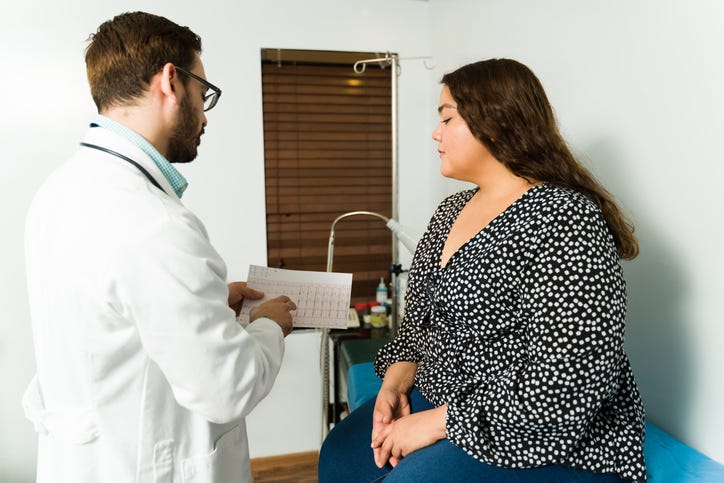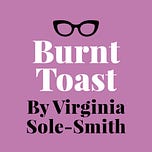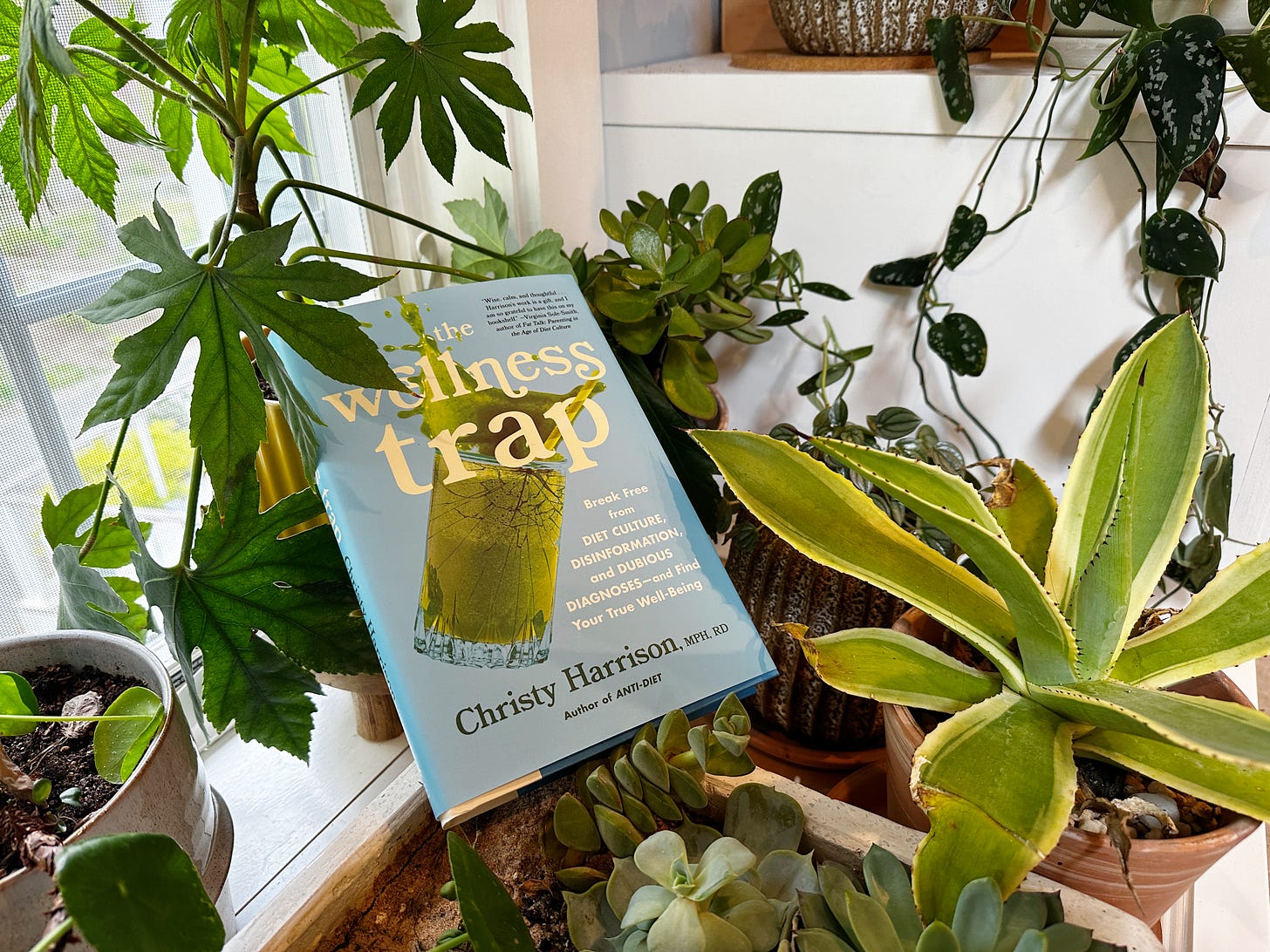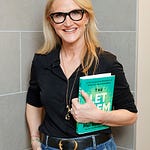“And as I learned in my research: Not only is it not evidence-based to cut out foods and do elimination diets for these conditions. But actually, there’s not really good evidence that these conditions even exist.”
You’re listening to Burnt Toast! This is the podcast where we talk about diet culture, fatphobia, parenting and health. I’m Virginia Sole-Smith. I also write the Burnt Toast newsletter.
Today I get to chat with my longtime friend and colleague ! Christy is a journalist, registered dietitian, and certified Intuitive Eating counselor. She’s the author of Anti-Diet: Reclaim Your Time, Money, Well-Being, and Happiness Through Intuitive Eating.
We are talking about Christy’s new book, The Wellness Trap: Break Free from Diet Culture, Disinformation, and Dubious Diagnoses, and Find Your True Well-Being. Christy’s wise, calm and thoughtful voice has helped to guide thousands of people out of diet culture and into better, more peaceful relationships with food and their bodies. In The Wellness Trap, she’s continuing this vital work, raising incisive questions, and helping us to unlearn decades of marketing and pseudoscience and reject this definition of health that is so pervasive, but both dangerous and impossible to sustain.
It’s a book I’m so grateful to have on my bookshelf. And remember, if you order The Wellness Trap or Anti-Diet from the Burnt Toast Bookshop, you can get 10 percent off that purchase if you also order (or have already ordered!) Fat Talk! (Just use the code FATTALK at checkout.)
You can also catch me on Christy’s new podcast this week! We’ve got kind of a crossover episode thing going. We talked about FAT TALK, of course, but I also talked about living with endometriosis and migraines, two chronic conditions that the wellness industry loves to target. These are pieces of my story I haven’t really talked about anywhere else, so listen here.
PS. Burnt Toast just made Apple Podcast’s list of top parenting podcasts! Of course we are not just for parents, but still cool. If you like the show, please leave us a rating and review in your podcast player! They really help us continue to grow.
Episode 92 Transcript
Virginia
So this is the first time we’ve gotten to catch up since you became a mom! And I just want to say: It’s very annoying that I’m leading with this question. Women get asked all the time to talk about this. Men rarely do. Although, I would ask it, if I had more male podcast guests who had recently become dads. But yeah: How are you doing? How do you feel like entering motherhood has changed or informed your relationship to everything you work on?
Christy
I’m doing okay. But I’m having a really hard time balancing mom life and work life. A big part of me just wants to leave work and be a stay-at-home mom. But honestly, we can’t afford to do that. And right now, I’m the primary earner and my husband is the primary childcare. So there’s that piece, the capitalism piece. And, I do love my work. I couldn’t imagine not having that be at least part of my life. So it’s just been a real adjustment of switching gears, switching back and forth.
I work from home and my daughter’s home. And so I will go fill my water and she’s there and wants to play or go to the bathroom. It’s great, but.
Virginia
It’s a constant mindset shift. Am I in work mode? Or am I in mom mode? And somehow you’re always in both, which is tough.
Christy
Especially in this day and age, when your email is in your pocket. So when I’m watching her, one eye is on the phone and then I feel terrible because I’m not present. And then, when I’m working, one ear is out for her or wanting to be with her. My heart is pulled in that direction. I just love her so much, and I want to spend all my time with her. She’s just at such a cute age right now, too. She’s starting to talk and walk and you know, all the things. All the milestones. So it’s been a real adjustment.
But in terms of how it’s affected or informed my relationship to the topics I cover, that’s also been really interesting. It’s made me so grateful that I was fortunate enough to heal my own relationship with food before having kids. And that is such a huge privilege. And expensive, right? That was like a decade of psychotherapy, at least.
Virginia
A lot of hard work and resources.
Christy
Exactly. It feels like it’s paid off in the sense that, yes, my body has changed, but I’m not fixated on that. Yes, food is sometimes tricky with her, like getting her to eat , but I’m not fixated on that.
It’s one thing to say, “yes, Division of Responsibility, trust your child’s body,” when you’re not in it. But it’s quite another when you have a toddler sitting in front of you screaming or fussing because they’re hungry but refusing to eat. So, there’s that piece, too, of wanting to make sure she has enough. Thankfully it’s not coming from this orthorexic place of “I need to get her more vegetables.” It’s literally like, “what will this child eat?”
Virginia
And how do we avoid hunger meltdowns an hour from now?
Christy
Yeah, exactly. It’s a strategy thing of managing her day and your day. If she’s hungry in an hour, you just give her more in an hour. And that’s fine. But as she’s starting to have more scheduled stuff going on there is that reality of having to plan.
Virginia
Right, what if we’re in the car in an hour and it’s actually not that easy? And yet that’s when they realize that they wish they ate that yogurt. We have all these best practices but in the moment, you can just forget it all.
Christy
When it’s your kid and you want to do the best for them. A lot of it is not life and death, but some of it really feels that way, like with the choking stuff. That’s something I have gotten kind of anxious about and been really meticulous about. “Okay, we have to cut this in this way and squish this thing,” and now it’s getting so vague because my daughter is over one. And so now a lot of the guidance that you see from reputable sources online is like, “well, if they’re under one cut the blueberries this way, but maybe they can have a whole blueberry once they’re one but maybe no.” Like, “see what your child’s capacity is,” you know?
Virginia
Just try it out. Figure it out. Can you measure their esophagus?
Christy
And I’m like, “No, thank you! Let’s just keep squishing them!” And. of course, my husband might have a different idea of what to do. It just feels so fraught. Even when you go to the pediatrician, for guidance, right? What should we do about this question that feels so fraught and we can’t come to an agreement? And they’re like, “Well, you could do it this way but you also could do it this way.” And like, “see what you think.” And it goes back to this do what feels right for you situation.
And we go to a pediatrician who’s a very conventional MD, not integrative or functional, or anything like that. But for a lot of things, I think there aren’t clear cut answers. It’s been really a lesson in having to let go and trust and just do the best we can to set our boundaries and our strategies and then maybe change them as things evolve.
Virginia
I think it’s such an exercise in learning to trust, getting to know your child and yourself as a parent and learning what makes sense for you. But the problem is, you don’t know that immediately. So there’s this gray area where you’re trying to figure out how to trust that and nobody ever has really good advice for getting to that place. It’s just time and experience that gets you more comfortable navigating those things. And it’s so much emotional and mental labor.
Christy
Yeah, it really is. Thankfully, I’m sort of out of the place where I was furiously googling at 3 in the morning. That first six months where you’re just like what is even happening? Like, “is this crying normal?” I feel like that all is somewhat in the rearview now. No one really talks about the toll that that takes on our mental health, right? That sense of not knowing what the hell is going on and feeling like you’re responsible.
Virginia
Oh, it’s a trauma for sure. And it has a long tail, I think, of processing how deep that fear was. Those 3 am rabbit holes, that’s a real thing.
Christy
And I mean, I didn’t even have to go through what you went through with a medical trauma.
Virginia
Oh, yeah. But just for everyone, across the board. Having a human that you are now responsible for keeping alive. It’s a whole thing for sure.
Christy
And they just send you home with them. Like, “okay, good luck!”
Virginia
What are they thinking?
Christy
Ugh, its ridiculous.
Virginia
Well, I think you are doing an amazing job. And at the very same time that you’ve been doing all of this, you’ve also been getting a new book ready and that’s what we’re here to talk about. So first of all, big applause for that! I think you had a similar timeline with this book as I had with my first book where you were writing it while you were pregnant.
Christy
That’s right.
Virginia
I think we were emailing about due dates of babies and books and how close together you want them to be. And then, of course, coming back from your maternity leave, and jumping right into getting ready to launch a book. It’s a lot.
Christy
It’s a lot.
Virginia
So the new book is called The Wellness Trap. It is a deep dive into the underbelly of modern wellness culture. It is fascinating! So impeccably researched, of course, because it’s Christy. Tell us what inspired this and what made you want to go deeper into wellness, especially right now.
Christy
In late 2020 I was seeing how the pandemic was making us so much more vulnerable to wellness culture, and how the wellness industry, wellness influencers, were capitalizing on COVID to sell products that had no good evidence behind them. Wellness culture in general was like leading people down rabbit holes of myths and disinformation and driving increases in conspiracism. We were starting to see QAnon popping up in wellness spaces and driving the anti-vax movement further into the mainstream, and just generally leading to some really weird and dangerous places.
So, that was the impetus to do the book at that time. I had covered wellness in a chapter in my first book and that’s a chapter that seemed to really resonate with a lot of readers. Wellness is the new guise of diet culture and it’s so insidious. People like will be like, “I’m recovering from my eating disorder. Now I’m just gonna get really into wellness.” It’s such a such a fraught territory.
That’s a lot of what we talked about when you interviewed me for your first book, right? The sustainable food movement, Michael Pollan, and all the problems with that. The anti-fat bias that’s inherent in those arguments, but also the anti-food bias, right? The demonization of certain foods and lionization of others and the orthorexic mindset that can come out of that. I see that so much with my clients who are recovering from disordered eating.
But something I’ve also seen a lot over the years with both clients and readers and listeners, is that people will come to me saying, “my functional medicine doctor diagnosed me with leaky gut syndrome,” or “my naturopath told me I have adrenal fatigue,” or “this person online told me I have chronic Candida and they told me to cut out all these foods and take out all these supplements as a way to treat it but it’s really messing up my relationship with food,” like, “How do I do these things that I need to to take care of my health while maintaining a peaceful relationship with food?” And I feel like that’s been happening more and more in recent years.
Virginia
Yes, and I just want to pause here for a minute because I have a feeling a lot of folks listening are like, “yes, yes, that’s me.” It is so common.
Talk a little bit about how you do approach this with clients? How do you think about it in terms of the book? Are there conditions where elimination diets are sometimes helpful and informative? Or do you see this very much as misdirecting people from really working on things that would actually be health promoting?
Christy
It’s such a good question. I want to empathize with anyone who’s in that position, first and foremost. I’m someone also with multiple chronic illnesses and things that took years to get diagnosed and have been down wellness rabbit holes myself, so I very much empathize with the desire for answers.
And yet, for those those three conditions I mentioned, which I cover in the book—chronic Candida, leaky gut syndrome, and adrenal fatigue—there’s this whole other layer to this. Not only is it not evidenc-based to cut out foods and do elimination diets for those conditions, but actually there’s not really good evidence that those conditions really exist.
The symptoms people experience are very real, and there are grains of truth in each of each of those conditions. People might be fatigued, but it’s not coming from your adrenals being exhausted or overworked. People might have digestive issues or acne and bloating and dry skin and all these disparate symptoms that might be related to something underlying, or might be all kinds of different conditions that are going on, that are not caused by a chronic overgrowth of yeast in your body. Or people might have digestive issues that are causing them distress, and that have a real medical explanation or are in part driven by disordered eating and some underlying medical stuff, but that’s not because your gut is leaky, and it’s causing all these all these symptoms throughout your body.
It’s really hard to untangle that. I think it’s become more common for people to want to seek out a holistic provider or someone who’s going to get to the root cause of things because so many of us are disillusioned by the health care system. I definitely have gone through my own experiences that left me feeling like conventional medicine was really lacking for chronic diseases and illnesses that I have. And so we get sort of excited by and attracted to providers who say, “I’m going to get to the root cause. I’m not just going to give you medicine, but I’m also going to figure out what’s actually going on give you a treatment that’s holistic.”
Virginia
I have endometriosis and I have migraines. I completely remember just feeling so dismissed. No one in my regular doctor’s office was considering my symptoms as anything more than just pain management. Like, “Let’s try Advil. If that doesn’t work, let’s try more Advil. And then let’s try some kind of prescription painkiller,” was the beginning and end of the conversation. So of course, it was so appealing to try to find some more cohesive explanation, right? Like some other condition or some thing that would link all of these murky symptoms together. It’s such an understandable place to be at and it makes me really angry at mainstream medicine for ignoring particularly women.
Christy
There are these things that I think conventional medical care is not necessarily set up to address. These quick 5 to 15 minute appointments that we have with most of our providers don’t really allow enough time to get into the details. One thing that integrative and functional and alternative medicine providers of all stripes provide really well is empathy and time.
But my experience and that of many people I’ve talked to, has been that can outweigh, at first, the fact that some of these providers aren’t giving evidence-based treatments, and in many cases are actually doing the thing that they accuse conventional medicine of: Prescribing a one size fits all solution. It’s painted in wellness culture, as if conventional medicine just wants to slap a bandaid on it, they want to just give you medicine to make the symptoms go away. They just care about symptom management, they don’t want to get to the root cause. Everybody’s treated the same. It’s not personalized or individualized.
But actually, in a lot of these wellness spaces, it’s kind of the same thing. Instead of giving you pain management or treating everyone who has a certain condition with a certain protocol, it’s okay, let’s give everyone who has this so-called condition, whether or not it’s a genuine condition, let’s have them cut out all these foods. Let’s have them take these supplements. Let’s have them do these protocols.
It’s not actually really addressing holistic health. It’s not addressing people’s wellbeing in a global sense. I think in many cases, we see people who struggle with those protocols and develop really disordered eating as a result.
I’ve had some people tell me, “I told my functional medicine doctor that I had an eating disorder history and to please take that into account and then they still recommended these elimination diets.”
Doctors don’t have the time and the resources to be up on everything. Our medical system is set up to be sort of siloed. So people have their specialties and unfortunately, disordered eating is seen as a specialty. It’s not seen as something that’s relevant to every provider.
Virginia
Maddening. It obviously is going to underpin everything.
Christy
As I talked about in my first book, eating disorder treatment is seen as a special silo and that it’s a really small percentage of the population that has eating disorders, really does a disservice to everyone. Because disordered eating—maybe not clinical eating disorders, although those are also far more prevalent than actually diagnosed—as a larger space and percentage of the population is so rampant.
Most providers, I would say, when they’re talking to someone, any patient that comes in their door is likely to be struggling with some level of disordered eating in our culture. I think this is especially true when we look at people with digestive disorders, right? One study found that 98% of people with eating disorders have a functional gut disorder, and 44.4% of people who in one study went to a specialty clinic for digestive disorders actually had disordered eating.
Virginia
So really, practitioners should be taking that as a baseline or at least that should be one of the first screening questions they’re asking with any new patient intake. Figuring out what this person’s relationship is with disordered eating and how do we need to protect them before we consider any protocols.

Christy
I think that that needs to be a first line question, a first line treatment. Getting people help for their disordered eating before putting them on any sort of elimination diet, I think, is essential. From what I’ve seen, in the research and what I’ve seen in my own clinical practice, I think that elimination diets are not the panacea they’re made out to be. They are, in a lot of cases, not effective. They can certainly drive people further into disordered eating, but even beyond that are not necessarily effective at identifying any sort of food sensitivities.
The placebo and nocebo effect are very real. People have pre-existing beliefs about certain types of foods and when you do an elimination diet where you’re systematically removing and then reintroducing foods, those beliefs can get activated. I think that providers in many cases exacerbate that, right? Like, okay, take out all these foods. And then you’re going to bring in gluten, you’re going to bring in dairy. Watch for symptoms. If you notice bloating, this and that. It’s making people hyper-focus on perceived symptoms.
And the mind body connection is very real. We know that the placebo effect actually has physiological effects on our body. It can activate the endogenous opioid system, which is how our body creates pain relief for itself. And so in conditions where pain is a big part of it, we can definitely have strong placebo effects and strong nocebo effects show up. So if someone is struggling with chronic pain or digestive pain, digestive distress, and they’re bringing back in a food that they believe is going to be harmful to them it really can activate this sense of increased pain and also just the act of hyper focusing on symptoms can make you notice them more in general.
Virginia
And there’s even some evidence that the GI symptoms you may be trying to resolve through the elimination diet, this process of tinkering and taking foods in and out can cause some of those same symptoms in some folks, right?
Christy
Absolutely. Not eating enough and having a fearful relationship with food absolutely has effects on the digestive system. Tinkering and taking foods in and out can change the microbiome. There’s a lot of buzz about the microbiome and gut health in wellness culture. And it’s always geared towards like, “we need to optimize the microbiome by taking out anything processed, by taking out all these foods that are considered to be bad and harmful.” But actually, we need diversity in our gut flora, right? That same diversity in the microbiome seems to be associated with better outcomes. And the science on the microbiome is in such in such an infancy state that we really don’t know the correlation versus causation there.
Virginia
It’s way too early to be translating that to clinical practice guidelines.
Christy
And yet, so many in the functional and integrative medicine spaces are doing just that. They are taking really early stage science and using it to recommend diets and other protocols to people across the board, right? Telling everyone to take out gluten, even though research really shows that there isn’t even necessarily such a thing as non-celiac gluten sensitivity. Because a lot of the research looking at people who self identify as having non-celiac gluten sensitivity will have people who already believe they’re sensitive to gluten, and then they go into a challenge where they’re given gluten and they know it, and they have symptoms, right? But of course, when you believe something is bad for you, the nocebo effect is very real. It can create real physical symptoms.
So it makes sense that people would report more symptoms in that case. But when people who believe they have non-celiac gluten sensitivity are blinded to the existence of gluten in their diets—so they’re given a baseline diet that is the same for the control and the study groups, and then given gluten in a hidden form, like in a muffin or in a pill, then people don’t actually report differences in symptoms. There’s no difference between the gluten group and the non-gluten group.
Virginia
I feel like that doesn’t sit that well with a lot of folks, Christy.
Christy
I know, I know. And I’m sorry to ruffle feathers. I mean, I was so there back in the early- to mid-2000s, when the early days of the gluten-free fad started happening. I was convinced that gluten was at the root of my problems and no one could tell me otherwise. I think I would have been very resentful to hear something like that at that time, too.
But, in my heart of hearts, looking back on it and even even at the time, I know that part of me was like, “Is this really helping? I don’t actually know. Like, I’m not sure If I feel better. I’m still bingeing, I’m just bingeing on gluten-free foods now. And my stomach is still hurting, I’m still having a lot of these other symptoms that I later realized were connected to endocrine and autoimmune conditions.” So it wasn’t totally clear.
I think for anyone who hears that and has a reaction and feels defensive and like, well, I don’t have celiac disease but I still react to gluten. I totally understand that. And it’s possible. It is possible. Who knows, right? But some people who have Celiac Disease are not diagnosed. So, that’s one thing to consider. Another thing to consider is whether or not there might be some placebo and nocebo effects at play. And whether whether you really do truly know that you feel better over time, right?
Because the placebo/nocebo effects are powerful drugs, but they can start to wear off over time. So giving yourself enough time to see, like, is this continuing to have an effect? If not, maybe it’s not gluten at all. Maybe there’s something else going on. And I think to listeners of this podcast, I would say especially consider your relationship with food. Consider whether disordered eating might be a play in anything going on for you.
Virginia
I just appreciate your empathy for all of that. I think it is tough for folks who have been experiencing these symptoms and really miserable and it’s so understandable to want these things to be the answers. But it’s not helping us in the long run if seizing on a diet-based changed as the answer also creates all this other distress and stress around how to manage that diet change.
Christy
And sometimes those diet changes can lead to more diet changes, right? If you feel like, okay, gluten, I don’t know if it 100 percent did the trick. I think in wellness culture and with wellness practitioners we are often encouraged then to cut out more foods, cut out more foods, cut out more foods, right? It can become this slippery slope into really restrictive and Orthorexic territory.
Virginia
I really want to talk about the anti-vax rabbit hole that you had to go down in this book, as well. I’ve done some reporting on vaccine controversies and talk about intense comment sections—it’s a wild ride. So I see your labor on this particular aspect of it.
When I became a parent in 2013, it seemed like we were just coming out of a period of really intense vaccine anxiety related to autism myths. (Thank you, Jenny McCarthy.) So when I had my first baby, there was lots of pro-vaccine sentiment in my parenting circles of people pushing back against that narrative. But of course, since COVID, we now have all this new vaccine fear-mongering. It seems like a lot of folks who were previously either pretty pro-vaccine or at least not taking a strong position have gotten more vaccine hesitant. Tell us a little bit about what you learned in terms of how the wellness industry is influencing all of this.
Christy
What I’ve found is that the wellness industry is very much at the heart of the anti-vax movement in this COVID phase. There’s been this longstanding entanglement. What we’ve really seen in this COVID phase is prominent wellness influencers who’ve been spreading a lot of other misinformation about food and supplements and other alternative medicine concepts. I don’t know if I should name any names here or not. I talk about them in the book.
Virginia
Oh, name names.
Christy
Okay, well, we’ve got people like Joseph Mercola, Kelly Brogan, Christiane Northrup, some of the big names in alternative medicine were among the anti-vaxxers who played leading roles in spreading misinformation about COVID vaccines on social media. They get people in with a diet and alternative medicine info, like the promise of healing chronic conditions or getting off medication through lifestyle changes and things like that. Then the anti-vaccine content becomes folded into those messages.
So, they’ll falsely claim that vaccines are unnecessary and harmful, toxic, and that if you’ve been vaccinated you need to detox but also that you need to boost your immune system through diets and supplements, which of course many of them sell. They’ll push back and say, I’ve meticulously sourced these supplements and they’re the best on the market, and I stand by them or whatever. But, that is in fact how they make millions of dollars in many cases, through selling supplements. So, something to consider, right?
Virginia
Sounds like a red flag for sure.
Christy
They’ll systematically target people in these wellness spaces and parenting spaces, as well. Recently there has been a lot more calling out of social media companies complicity with this because these anti-vax entrepreneurs would you use Facebook ads to target people and that was a very big part of how they built their audiences. Or they would use other social media platforms to get people in, to get people into their groups. And there’s been some cracking down on on anti-vax misinformation on social media, although not nearly enough.
One thing I’ve seen, a few months ago with Joseph Mercola is that he’ll post something kind of wellness-y but innocuous that doesn’t seem at all related to vaccines. The body of the tweet will be like, what the shapes in your poop can tell you about your health or something. And then you click the link and the actual link go is to an anti-vax piece of content.
Virginia
Oh my God. It’s like putting like disinformation on top of disinformation! Also the shapes in your poop don’t tell you your horoscope or whatever he’s claiming.
Christy
Right, right. No, it’s totally ridiculous. So that’s how wellness and the anti-vax movement are so intertwined.
But I think even leaving aside these, I think the wellness space itself was really primed for this kind of misinformation to spread because it really preys on the idea that you shouldn’t put anything quote unquote unnatural in your body. Like, I think that’s the primary way that people get pulled into this worldview is thinking about pure food, but then it sort of bleeds over.
There’s a slippery slope of that purity type of thinking to household products, makeup, skincare, anything in on or around your body, right? It has to be totally pure and meet all these arbitrary criteria. Then from there it can be a really easy slide to rhetoric around vaccines being supposedly unnatural or toxic or whatever and conspiracy theories about Big Pharma are really kind of endemic to wellness culture already.
A lot of people listening to this probably are like, “Well, I’m too smart for that. I wouldn’t be vulnerable to that. I think that’s bananas,” you know. And that’s fair. And I think for many people it might be true, that the really bizarre conspiracy theories aren’t necessarily going to take you in. But I interviewed a number of former anti-vaxxers who are smart people, thoughtful people, parents, who wanted to do the best for their kids. And I think that really makes people vulnerable.
Virginia
I mean, just thinking of what we were talking about at the beginning, of the anxiety about your baby choking on blueberries. Like, when you think about the baseline fear that we very naturally are living with as we’re trying to raise our children and keep them alive. We’re incredibly vulnerable. It does make sense to me that getting a little piece of this, and then you get another little piece of this. No one goes for the microchip theory first, but you can see how really smart rational people could build their way towards that. And that’s super insidious.
Christy
Even if you have one or two crunchy parent types of things that you’re interested in or do. In the book, I talked to Renee DiResta who’s now a researcher studying mis- and disinformation who herself got interested in these ideas because when she had her first baby, she was looking for information about cloth diapering and making your own baby food, which were things she was interested in. Even though she isn’t like really a crunchy parent, but she had a couple of crunchy interests.
Virginia
All of this is fascinating and depressing and enraging, and making me feel many things. Like, where do we go with this? What do we do to start divesting if we’ve bought into some of these ideas and systems? What should we be advocating for instead?
Christy
I think, at the societal level, we really need to make some changes to how the wellness industry is regulated to how the supplement industry is regulated to how social media is regulated.
I talk a bit about that in the book. Amending section 230 of the Communications Decency Act, which is kind of in the weeds, but also a huge deal. Section 230 is called the 25 words that created the internet. It basically allows any social media company not to have the same legal requirements on it that a publisher would have. So you know how people can sue Fox News for defamation, right? They’re allowed to bring a defamation suit against a publisher because of the legal requirements on publishers to publish the truth and not defame individuals or companies. Whereas social media companies and other platforms online that host user generated content are not considered publishers of information. So, anything that users post is not subject to those same requirements.
So one proposed solution is to amend the Communications Decency Act to not exempt algorithms for promoting things. Because social media algorithms amplify myths and disinformation. They have been shown to spread that farther, more widely, deeper than the truth. And that’s because these algorithms are designed to maximize engagement. They’re designed to keep people clicking.
Virginia
On the most extreme things.
Christy
They get engagement from people who are fighting in the comments. They keep you on the platform to be served ads longer. That’s what’s effective. It’s not done that way nefariously. These algorithms weren’t programmed to make us outraged intentionally. It’s just what happened to create the most engagement. So, if we could amend the Communications Decency Act to say platforms may not be liable for everything their users post, but they are liable for algorithmically amplifying content.
Virginia
That would be huge.
Christy
And in fact, Congress has been debating amending Section 230 recently. So call your Congress people.
But at the individual level, too, I think there are ways to keep yourself more safe from this kind of mis- and disinformation, both practically and also psychologically.
One thing is called the SIFT check which is a method for sussing out misinformation and separating the wheat from the chaff. It was developed by a researcher at Washington State University Vancouver named Mike Caulfield who studies digital media literacy. It’s four steps: SIFT. So it’s Stop; Investigate the source; Find better coverage; and Trace claims, quotes and media to the original context. Don’t just take this one social media post as a referendum on what you should be doing.
Virginia
Which usually have no sourcing, statistics that have no citations attached. Totally just numbers that someone put on a picture in Canva.
Christy
Yep, exactly. The whole point of SIFT really is to have a quick check to say let me just take myself out of the flow of this information rather than deeply engaging with it because Caulfield’s point is that critical thinking is actually deeply engaging with something. That’s what disinformation wants you to do because the more you deeply engage, the more primed you are for more disinformation, right? So if you can quickly take yourself out of the flow of it, that helps you from getting indoctrinated by it and it helps also keep it from spreading.
Virginia
Such good advice and it’s something we can teach the kids, too, which I really love. It seems like a really useful tool to keep in our back pockets.
Christy
Totally.
Butter for for your Burnt Toast
Christy
I’ve been really enjoying the show Severance. I am not not super far into it yet. I’m several episodes in, so I won’t give any spoilers and anyone who’s listening don’t give any spoilers, but…
Virginia
I won’t but good choice.
Christy
It’s fascinating. I think it’s also really appealing to me maybe because of my difficulty balancing work life and mom life and everything else. It’s making me think deeply and interestingly about what it means to have a separation between the two. And the fact that the messiness and the difficulty with that balance and the need to like pare down our commitments, is actually a very human thing and a very important thing. And if we are severed in our work life and personal life, the incredible harms that can cause and the way that late stage capitalism pushes us in that direction, to try to be a ton of automatons who are just working through everything. With everything that’s happened in the last several years, I think more and more people are now pushing back on that. So it’s an interesting show for this time.
Virginia
Oh, it’s brilliant. Brilliant. And this is not a spoiler, but I will just say when you get to the season finale, it is the most riveting 45 minutes of television I can remember watching in years. Dan and I were just mouths open the entire time, like what is happening! I was so tense, but it was in a good way. So it’s a great recommendation for anyone who hasn’t gotten there and season two is coming soon.
Christy
Exactly. Then you can get in there.
Virginia
So my recommendation is a really great YA novel I just read called Love Is a Revolution by Renee Watson. The main character is Nala who is black plus-sized girl in living in Harlem, and her relationships with her friends and her family. It’s so great because it centers a fat character but it is not about her weight. That’s just there. At one point somebody says something about, like, does she like her body and she’s like, stop assuming I don’t like my body just because I’m fat. Like, go away. I’ve been very into light and comforting reads in the last, oh, I don’t know, five years. Maybe because a lot of the time what we do for work is heavy and I need escape. But I’m also always looking for great fat representation and this definitely checks all of those boxes. So anyone looking for a great weekend read. And I would say totally appropriate for 10-11 and up, for sure, for kids.
Christy
That’s awesome. I’m going to check that out, too.
Virginia
Christy, thank you so much. This was great. Everyone, of course, needs to go get The Wellness Trap anywhere you buy books. Tell us how else we can support you and support your work.
Christy
Yeah, thank you so much for having me. It’s such a great conversation. People can find me at my website, Christyharrison.com. I also now have not one but two podcasts. I have a new podcast called
that continues the conversation about all these things we’ve been talking about. I was just so fascinated by everyone I interviewed for the book and wanted a space to continue those conversations. So definitely you can check that out wherever you’re listening to this.Virginia
Perfect thank you so much, Christy. This was wonderful.
Christy
Thank you so much, Virginia.
The Burnt Toast Podcast is produced and hosted by me, Virginia Sole-Smith. You can follow me on Instagram or Twitter.
Burnt Toast transcripts and essays are edited and formatted by Corinne Fay, who runs @SellTradePlus, an Instagram account where you can buy and sell plus size clothing and also co-hosts mailbag episodes!
The Burnt Toast logo is by Deanna Lowe.
Our theme music is by Jeff Bailey and Chris Maxwell.
Tommy Harron is our audio engineer.
Thanks for listening and for supporting anti-diet, body liberation journalism!


















Share this post